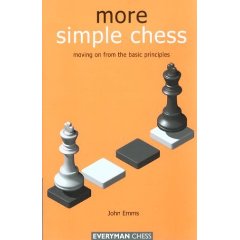|
moving on from the basic principles

5.0 out of 5 stars Ideas on Chess Strategy for the Club Player, October 5, 2009
By Christopher Falter "Chris
Falter" (Irmo, SC)
This is not a treatise on the key ideas in chess strategy; it's more of a "here are some interesting ideas on strategic
themes for club players" book. Considerations when exchanging pieces, retreating backwards to reposition pieces, the queen's
struggle against 2 rooks or R + minor + pawn in an endgame, and kings stumbling into endgame checkmates all show up in this
work. Emms has chosen some excellent games, and his annotations are first-rate. Each chapter ends with a short quiz, usually
3 or 4 positions. Emms writes sparkling prose, too, so you can hardly go wrong. It's a fun and helpful read for players rated
in the Elo 1500-2000 range, although I wouldn't be surprised if an expert (2000-2200) found some useful material within these
pages. I'd say the book rates 4.5 stars for helping you improve in your chess ability, but I'll round up because I had so
much fun reading it.
|
|
p.9 Having to deal with ineffective pieces (I've called them problem pieces) is a perennial problem for
the chess player, whether it is trying to make the best out of your own or attempting to subdue or exploit your opponent's.
It's very difficult to make every piece happy - pawn structures will always dictate that some pieces are in a better mood
than others
p.9 In positions of strategic manoeuvering (where time is not of decisive importance) seek the worst
placed piece. Activating that piece is often the most reliable way of improving your position as a whole. -[Mark] Dvoretsky
... Players have a tendency to forget about their ineffective pieces until a concrete problem concerning that piece arises,
preferring to concentrate on making the most of their more active ones. However, by the time a specific problem occurs, it
may be too late to rectify matters. Instead it's often worth taking time out earlier on to look for a solution.
p.22 Mikhail Botvinnik [quoted] 'In my opinion, the process of chess is based essentially on interlinking
exchanges. The objective of these interlinking exchanges is a relative gain ... of material or of positional value. There
are no other and cannot be any other objectives. At the end of the game these exchanges must lead to a gain of infinitely
large magnitude (to mate)'.
|
 |
|
|
 |
|
|
 |
|
|
|

